Aside from when you come home, meal time is probably your Dachshunds favorite part of the day.
The scene plays out the same most nights: you tip a bag of their favorite kibble into their bowl and hear a clamor from the other room as your dog races to his favorite dine-in restaurant.
They practically devour the bowl in the madness of chowing down.
You’re both satisfied – they’ve just finished a good meal and you’re happy to have taken care of your little friend. But what happens when your Dachshund won’t eat?
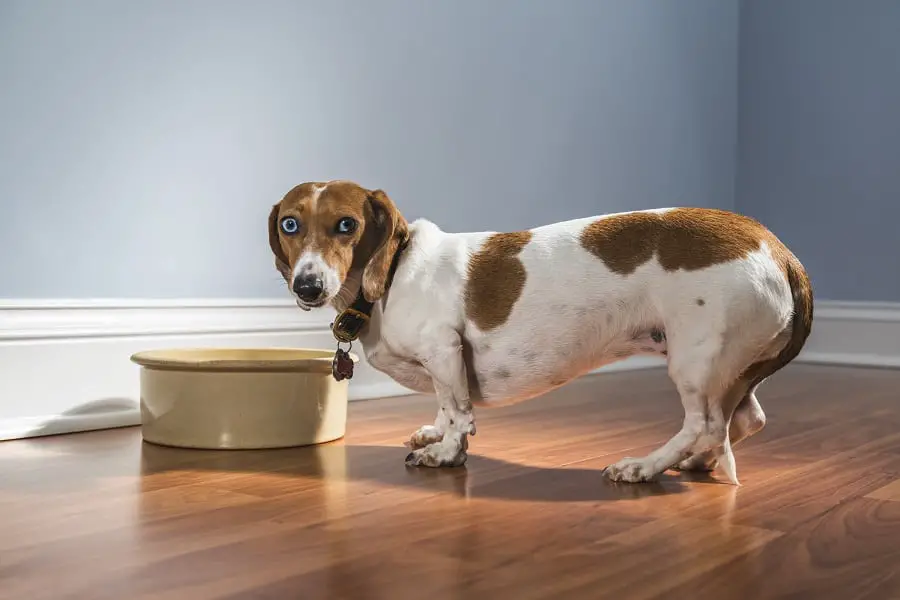
Loss of appetite in dogs can range from a very serious health issue to a mild behavioral disturbance.
Either way, this should be cause for some alarm and corrective action, afterall, a dog can only go so long without eating.
Why Aren’t They Eating?
The very first step to take in any situation where your Dachshund has lost their appetite is to determine the cause.
Think back on the last few days and their past behavior while asking yourself if there have been any changes to your routine. Ask yourself:
How long has it been since they last ate?
This is the first question which should be on your mind. This will give you a starting point from which you will track the change in your Dachshunds appetite.
Have I changed their food source?
Consider any modifications to their food you may have made since they last ate.
Swapping brands or switching up the style of meat within the same brand, going from soft to hard food or vice versa, eliminating alterations you typically make such as adding gravy or hot water to their food, all of these can affect your Dachshunds appetite.
Is your dachshund anxious?
Have you recently moved? Has there been ongoing construction or sources of noise near your home?
Have you been away for longer than usual or changed your schedule and that of your Dachshund in the process?
Even slight changes in daily routine can be enough to trigger stress with your Dachshund.
Consider all possible avenues and document any behavioral changes your dog has shown.
Is your dog still taking in water?
A big sign that the problem is only behavioral is that you Dachshund is still taking in water, but not eating its typical food.
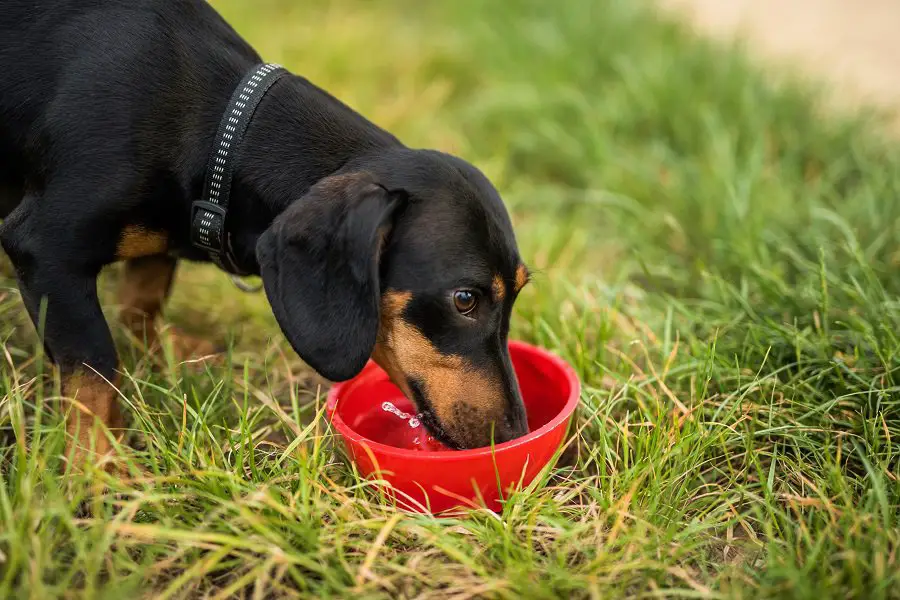
Note, this IS NOT the resolve for every case as your dog may be having trouble eating solid foods, but IS a good indication that your dog may be becoming a pickier eater.
Is your dachshund in good health?
How engaged was your dog the last time you two played together? When was its last veterinary appointment and what did they have to say about the health of your dog?
Changes in behavior can signify health-related issues which may induce loss of appetite.
Always be on the lookout for slight changes in your Dachshunds temperament and whether or not the changes come or go.
What is the source of the issue?
Once you have a good idea of what may have caused your dog to lose its hunger, begin to observe their behavior and make a note of any way it has changed or is changing.
Inspect their teeth and body for any injuries that may be causing the erratic behavior.
Check their food for issues – check expiration dates and make sure there isn’t any mold or other possible problems.
Finally, reexamine all the previous steps with any new knowledge you may have gathered.
Observing your dachshund’s behavior
Monitoring your dog’s behavior can help reveal some underlying issues causing the loss of appetite.
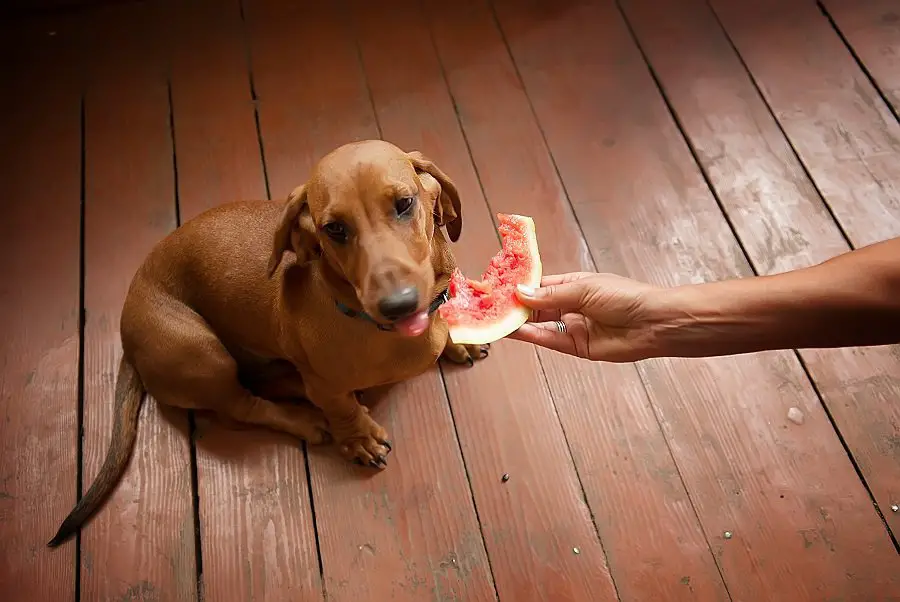
Try feeding your Dachshund different types of foods. If it doesn’t eat anything and won’t take in water, this should be a red flag that your dog may need to go to the vet.
Ensure your dog isn’t behaving unusually and that it hasn’t changed its daily routine. Keep a close eye on their stool or urine.
If everything checks out, it should be fine to let them miss a meal.
On the other hand, if your Dachshund has diarrhea or is vomiting, or if they’re sluggish and seem dehydrated, consult a vet.
Inspect your dachshunds teeth and body
Typically dogs will be weary of having their teeth inspected.
The best method if you have not groomed them for these checks is to find a quiet space and gently lift the flaps of their gums for a quick check.
Pay attention to the color of their gums, any developing lumps, signs of broken or chipped teeth or areas that seem to be a source of pain.
Once you have inspected one side, be sure to use the same method on the other side.
To check the back of the mouth, offer your pet a treat or simply open their mouth in a relaxed environment.
If your Dachshund is eating, pay attention to whether they prefer one side of their mouth over the other and make a note of it.
These inspections can save a lot of time at the vet if the problem seems to be with their mouth.
When inspecting your Dachshunds body, again check for lumps or overt injuries.
Gently massage your pet’s body and be on the lookout for any winces or signs of pain in specific areas.
Check their fur and skin for any signs of changes. Look for parasites like ticks and if you find anything suspicious, check with your vet.
Examine dachshunds food
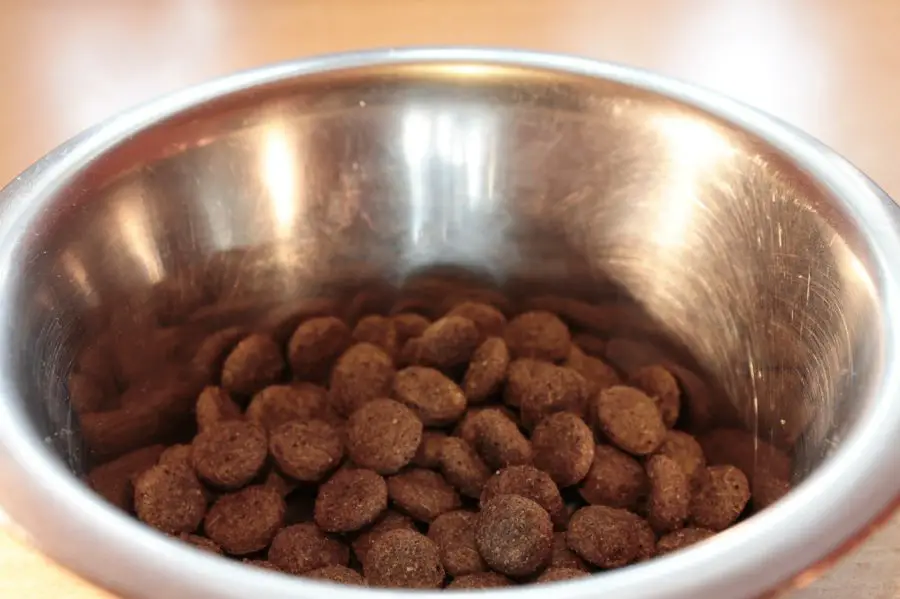
Something to consider if your dog isn’t eating their normal food is to inspect it for spoiling. Check the expiration date and look out for any changes in smell and color.
If the food seems to have gone bad, replace it with a new food source and try feeding your Dachshund again.
Reexamining your actions
Have you been more relaxed with table scraps as of late? Have you given them a lot of treats?
If this is the case, they might not be hungry or are waiting for something more savory such as food chunks or dog treats.
Take any of the new information you’ve gathered from these pre-examinations and try to test out what you think might be the source of the issue.
How do we get your dachshund to start eating again?
If you suspect any of the above issues are at fault for your Dachshund’s lack of appetite, try different solutions based on your suspected issue. If they still do not eat or have not eaten in a couple of days, it is best to take them into the vet in order to get professional advice.
Below are some pointers and tips for training your dog to eat again if you suspect your problem lies in the issues above.
Not eating typical food
Has your Dachshund stopped eating its usual food? Leave it out for 15 minutes twice a day and that’s it.
If this is a taste-related issue, your dog will eat its typical meal at some point using this method.

Stop leaving the food out all day, or cut down on portion sizes if food usually stays in their bowl.
You may also need to retrain your dog so that it will not beg for table scraps and treats.
If they have received a lot of these more savory items as of late, they will definitely not value their typical meal.
Another approach to try is to spice up their typical meal with a few cheap enhancements. Adding gravy or leftover grease to the meal can help increase your dogs appetite.
Do not however do this daily.
If your dog is choosing to starve itself in the hopes you will feed it more table scraps, this method will only make the problem worse.
If this is the case, add gravy or table scraps to the meal and decrease the amount over time. Combine this method with limiting their food time slot for the best results.
Alleviating anxiety
Could your Dachshund not be eating because of anxiety?
If you’ve changed their environment or there have been loud noises or many strangers entering your home, your Dachshund may be upset and lose its hunger.
Before seeking medication for your dog anxiety from a trained physician, some precursor behavioral modification may help.
First of all, absolutely avoid punishment for any behavior you suspect may come from phobias of anxiety. This will only make the problem worse.
Second, try not to reassure your Dachshund in the midst of an anxiety attack as it may interpret this as a reward for its behavior.
Simply encourage calmness, but do not reinforce the fear reaction.
If you have discovered the source of their anxiety, counter conditioning can be an effective way to deal with the fear or phobia your Dachshund may have.
Repeated, controlled exposure to the stimulus may help to desensitize your pet to the cause of their anxiety and help them eat again.
Gauge your dogs reaction to several levels of the stimulus to help establish a starting point for desensitization.
Introduce them to their new surroundings if you have just moved. Take them to the construction site if the source was the noise from the site.
Try different approaches and see what works best for your dog.
Bad teeth or diminished health
If you suspect the issue lies in your Dachshunds health or teeth, try to engage them in play that will affect those areas.
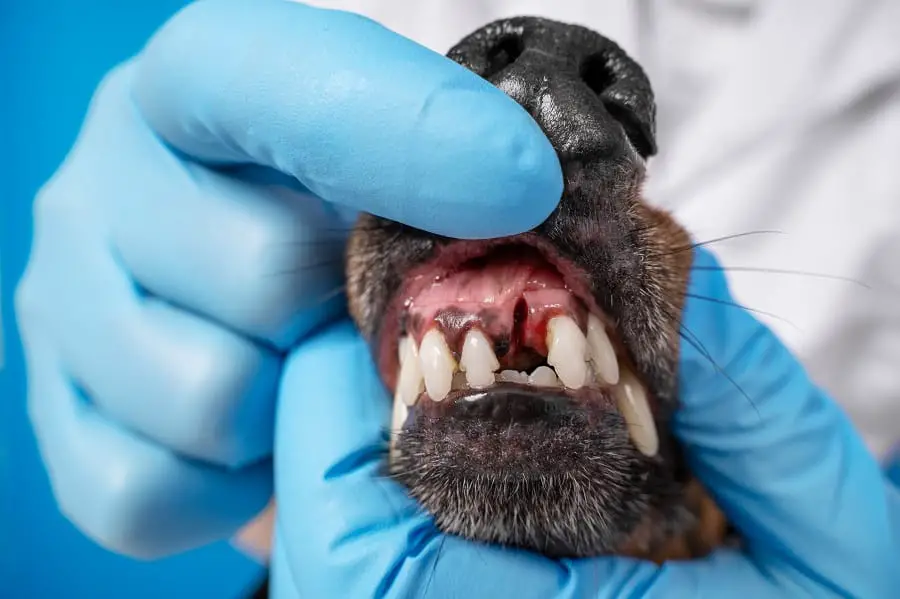
Bring out their favorite toy and try to pull it from their mouth.
If they refuse to play the same way they used to or seem to be preferring one side of their mouth or body when playing, focus in on that area with play that is specifically geared towards engaging it.
If they seem to be wincing in pain or are avoiding a particular area of their body, apply light pressure to the afflicted area to make sure this area is in pain.
Be light and keep in mind that your Dachshund may be in a lot of pain when checking this area for damage.
Conclusion
In the end, if none of the above solutions help your Dachshund eat, it is best to seek professional help. The issues and solutions may not be as overt or explainable.
Do not allow your dog to go longer than 3 days without food or 2 days without water.
Keep in mind that this is a problem the two of you need to tackle together – your Dachshund cannot express to you the source of their issue and can not solve it without your help.
